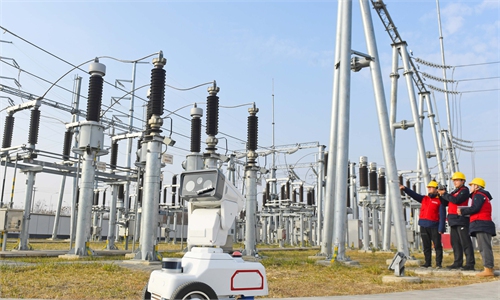Baidu releases first self-developed AI infrastructure ‘AI Base’, serving buildup of ‘new infrastructure’ in China

Students learn to drive on an artificial intelligence (AI) simulator at a driving school in Southwest China's Chongqing Municipality on August 9, 2022. The school uses AI simulators and robot coaches to assist teaching. The simulated driving scene is 100 percent like the real scene. Photo: VCG
Tech giant Baidu on Tuesday released its first full-stack self-developed AI infrastructure 'AI Base' in China, as more Chinese companies are accelerating efforts to prioritize investment in "new infrastructure".
The announcement came at a forum held by Baidu AI Cloud on Tuesday. Baidu said that the purpose of the initiative is to essentially help enterprises reduce cost and increase efficiency through generalization and modularization of underlying AI technology.
The meeting also marked the release of the Yangquan Intelligent Computing Center equipped with Baidu's "AI Big Base" full-stack capability to the public. The center is currently the largest single intelligent computing center in Asia.
With the continuous popularization of intelligent industrial applications such as intelligent dispatching, automatic driving, and industrial networking, China's industry is facing a critical window in the transition from digitalization to intelligentization.
At the same time, the emergence of technical applications such as large models is accelerating the development of AI clouds, which signals new requirements for China's cloud computing industry.
"The big base of AI is to help customers move from the cloud to the fast track of using data and empowering intelligence, greatly reducing the threshold for AI industry applications and improving efficiency. Enterprises only need to focus on scene business," said Shen Dou, Executive Vice President of Baidu, President of Baidu AI Cloud Group at the forum.
The value created by intelligence for China's industrial upgrading has just begun, said Shen.
In the financial field, relying on the Baidu Smart Cloud AI base, the Postal Savings Bank of China built the first bank-wide unified machine learning platform "PSBC Brain" among large domestic commercial banks, and built a bank-wide machine learning platform.
Following its online application, the data cleaning and data analysis time for the credit card billion-level samples has been reduced from monthly and weekly levels to the hourly level, which greatly improves the efficiency of the most arduous data processing work.
The concept of "new infrastructure," which covers emerging advanced areas such as 5G, artificial intelligence, the industrial internet and the Internet of things, was first cited by the Central Economic Work Conference in 2018 and later in the 2019 Government's Work Report. But investment in "new infrastructure" accelerated in 2020 following the outbreak of the pandemic, when China moved to boost economic growth, while avoiding "opening the floodgate of stimulus".
China has achieved initial success in new infrastructure construction, which has greatly facilitated the country's social and economic development over the past decade, officials said in September.
Zhang Zhihua, an official from the National Development and Reform Commission, said China has accelerated its steps in upgrading information infrastructure as well as advancing infrastructure integration and innovation, according to the Xinhua News Agency on September 26.


